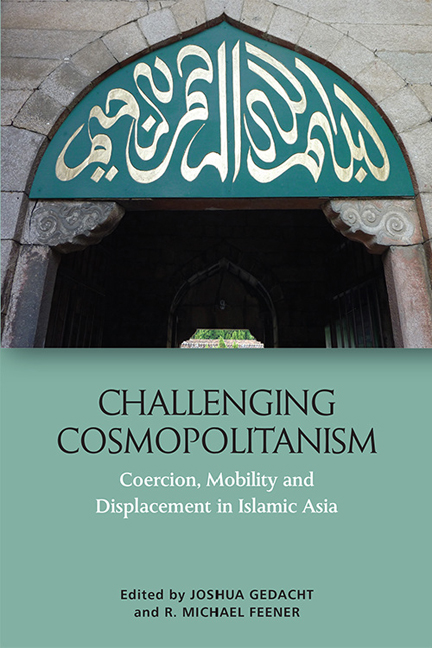Book contents
- Frontmatter
- Contents
- Preface
- 1 Hijra, Ḥajj and Muslim Mobilities: Considering Coercion and Asymmetrical Power Dynamics in Histories of Islamic Cosmopolitanism
- 2 Islamicate Cosmopolitanism from North Africa to Southeast Asia
- 3 Sufi Cosmopolitanism in the Seventeenth-century Indian Ocean: Sharīʿa, Lineage and Royal Power in Southeast Asia and the Maldives
- 4 The White Heron Called by the Muezzin: Shrines, Sufis and Warlords in Early Modern Java
- 5 Variations of ‘Islamic Military Cosmopolitanism’: The Survival Strategies of Hui Muslims during the Modern Period
- 6 Writing Cosmopolitan History in Nineteenth-century China: Li Huanyi’s Words and Deeds of Islamic Exemplars
- 7 The ‘Shaykh al-Islām of the Philippines’ and Coercive Cosmopolitanism in an Age of Global Empire
- 8 Bordering Malaya’s ‘Benighted Lands’: Frontiers of Race and Colonialism on the Malay Peninsula, 1887–1902
- 9 Afghanistan’s Cosmopolitan Trading Networks: A View From Yiwu, China
- Notes on the Contributors
- Index
Preface
Published online by Cambridge University Press: 01 May 2021
- Frontmatter
- Contents
- Preface
- 1 Hijra, Ḥajj and Muslim Mobilities: Considering Coercion and Asymmetrical Power Dynamics in Histories of Islamic Cosmopolitanism
- 2 Islamicate Cosmopolitanism from North Africa to Southeast Asia
- 3 Sufi Cosmopolitanism in the Seventeenth-century Indian Ocean: Sharīʿa, Lineage and Royal Power in Southeast Asia and the Maldives
- 4 The White Heron Called by the Muezzin: Shrines, Sufis and Warlords in Early Modern Java
- 5 Variations of ‘Islamic Military Cosmopolitanism’: The Survival Strategies of Hui Muslims during the Modern Period
- 6 Writing Cosmopolitan History in Nineteenth-century China: Li Huanyi’s Words and Deeds of Islamic Exemplars
- 7 The ‘Shaykh al-Islām of the Philippines’ and Coercive Cosmopolitanism in an Age of Global Empire
- 8 Bordering Malaya’s ‘Benighted Lands’: Frontiers of Race and Colonialism on the Malay Peninsula, 1887–1902
- 9 Afghanistan’s Cosmopolitan Trading Networks: A View From Yiwu, China
- Notes on the Contributors
- Index
Summary
‘Cosmopolitanism’ has come to be an ubiquitous category of scholarly analysis in discussions of the dynamic histories and cultures of Muslim peoples in many parts of the world. In particular, the term has come to stand for a vision of community that extends beyond the particularistic limitations of kinship, ethnicity or nation to encompass an ‘ummatic’ or even more ‘humanistic’ vision of inclusivity and acceptance. Such visions, in turn, usually encompass a vast complex of attributes: of diversity, religious pluralism, and openness to others; of mobility and travel; and of yearning for a universal community of faith that can transcend the mundane boundaries of everyday life. Many historians, anthropologists and religious studies scholars have deployed the concept of cosmopolitanism to frame discussions of topics such as the circulation of Muslim texts, trading diasporas and interactions between members of different religious traditions. Some have used the term more as an adjectival signifier for what they view as ‘positive’ aspects of Muslim histories, often intending this as a potential corrective to contemporary crises of community and co-existence. In this, cosmopolitanism has often been looked to as an antidote to the plagues of obscurantism, sectarianism and violence that still too often attaches to visions of Muslim societies by contemporary observers outside the tradition. Such discussions have displayed a tendency toward the abstract and the idealised. However, any full accounting of cosmopolitanism requires moving past normative visions toward understandings of the world as it actually was (and is), with all its attendant tensions, dislocations and displacements.
Recent histories have sought to move past more theoretical articulations to understanding the day-to-day struggles that mobility and the interests of state and other powers can produce. Stimulated by this emerging and thought-provoking scholarship, our aim is to challenge cosmopolitanism by focusing on various contexts of coercion across Asia. This volume provides a more complex and nuanced understanding of what cosmopolitanism might look like in historical practice. It includes contributions from historians and anthropologists exploring past dynamics and enduring legacies of coercive dynamics on the production of Muslim cosmopolitanism across diverse Asian contexts, particularly China, Southeast Asia and the Indian Ocean world.
- Type
- Chapter
- Information
- Challenging CosmopolitanismCoercion, Mobility and Displacement in Islamic Asia, pp. vii - xPublisher: Edinburgh University PressPrint publication year: 2018



